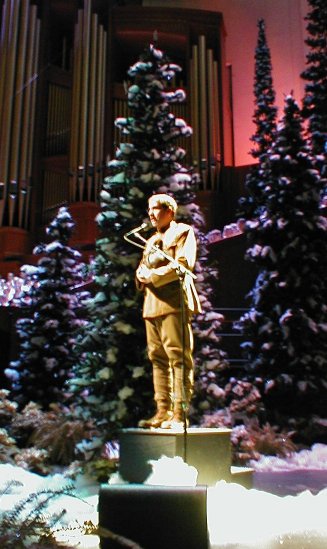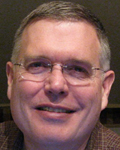![]()
Silent Night, Holy Night
Walter Cronkite and the Mormon Tabernacle Choir
by Robb Cundick

Walter Cronkite conducts the Mormon Tabernacle Choir and Orchestra at Temple Square in the Hallelujah Chorus from Handel’s Messiah.
It has been less than a year since the triumph of the 2002 Winter Olympics, when Salt Lake City came together and showed the world its very best; and yet we have recently experienced a painful period of divisiveness. Last week the controversy over free speech on the Church’s Main Street Plaza reached a fever pitch. Hurtful incidents occurred, with protestors shouting taunts and even obscenities at people entering and leaving the temple. Thankfully, things are cooling down now that Mayor Rocky Anderson has proposed a second compromise. But even beyond these events, the prospect of war with Iraq and persistent news of violence in the Holy Land are discouraging reminders of the dark side of human nature. It is a time when we are badly in need of the spirit of Christmas.
Plans for the Christmas ConcertsLeaders of the Mormon Tabernacle Choir were elated when Walter Cronkite agreed to be our special guest for the Christmas concerts, but it was already late October and they had yet to decide how best to use his talents. Given the mood of current events, they felt it was an especially important time to foster the spirit of peace and goodwill. Choir director Craig Jessop recalled a remarkable story where the teachings of the Savior prevailed under the most trying of circumstances; it was the story of a World War I Christmas Eve, when opposing armies laid down their arms and celebrated Christmas together. Thus it was that a narration of the events of that singular night became the centerpiece of our 2002 Christmas concert.
Many talents were brought together for this endeavor. Brother Jessop said he had never worked on a project where the Spirit of the Lord poured down so freely. The script, “Silent Night, Holy Night,” was researched and written by Steve Wunderli, a Creative Director at Bonneville Communications (Steve is responsible for the creation of the popular Homefront series of Public Service Announcements for the Church). Mack Wilberg composed gorgeous background music and arranged carols to be interwoven into the story; and five talented young men were recruited to dress as World War I soldiers, portraying men who participated in the events. Add to this the talents of Walter Cronkite, and the potential became truly exciting.
For those of you who may be too young to remember or who live outside the United States, let me just say that there has never been a more beloved newsman than Walter Cronkite. His voice is perhaps the most famous in all of broadcasting. From his debut on the CBS Evening News in 1962 until his retirement in 1981, he developed such rapport with viewers that he was voted the most trusted man in America. Those of us raised on a daily dose of the CBS Evening News will never forget his familiar closing words at the end of each broadcast – on his last day they would have been, “And that’s the way it is, Friday, March 6th, 1981. Good Night.” Walter is a man of such character as to remind one of last year’s guest, Angela Lansbury. Born in 1916 at St. Joseph, Missouri, he has been married to Mary Elizabeth Maxwell (Betsy) for 62 years. In his aging years he continues to be a shining example of the journalistic values that form his credo: accuracy, fairness, and honesty.

Mr. Cronkite listens to instructions before the dress rehearsal.
When he was introduced to the choir and orchestra, Mr. Cronkite expressed delight at this opportunity to appear with us. He said that when he was informed of the possibility, he found himself so eager that he reacted more quickly than professionalism would normally dictate (he later told the Deseret News, “We settled the scheduling conflicts easily by canceling everything else.”). He said this was an experience he looked forward to telling his grandchildren about.
Starting with the dress rehearsal on Thursday, the concert was performed on three nights to a packed Conference Center. A shortened version was presented Sunday morning for Music and the Spoken Word. While there were some empty seats on Sunday, the combined number of people to attend the performances was in the neighborhood of 75,000 – what a contrast to the old days in the Tabernacle!
Each night as he greeted the audience, Mr. Cronkite offered a few personal observations. He mentioned how his mother and father were among the first to have a radio, and how every Sunday the family would listen to the Tabernacle Choir. We laughed when he said, “I hope that somewhere, Mom and Dad are proud that little Walter is performing with the Mormon Tabernacle Choir.”
But what was most inspiring was to observe how each night his praise for the people of Salt Lake City became more enthusiastic. As was the case with Miss Lansbury last year, the longer he stayed the more he felt of the spirit. Brother Jessop relayed a comment he made at lunch one day: “I have never been a religious person in the conventional sense, but I have felt nearer to my God the past couple of days than ever before.”

Conducting the Hallelujah Chorus
Besides narrating the story about WWI, Mr. Cronkite was to be featured in a surprise number that did not appear on the program. When Brother Jessop learned that he had experienced leading a military band, he decided to invite him to lead Handel’s Hallelujah Chorus. At the rehearsal, Mr. Cronkite said, “I’m going to conduct to the best of my ability but for heaven’s sake, don’t follow me! Just kind of go along with it and do exactly what you’d do if I weren’t there.”
His smile and enthusiasm while leading the chorus made it clear that he was having the time of his life; he did a terrific job – and had a great sense of style. After the last performance he said, “I’m not a professional conductor – not even an amateur. I’m just a really bad fake. I have learned that the key is to reduce the number of ‘miniseconds’ between what you do and what I do.” But he really did maintain a steady beat that was easy to follow.
However I must make sure to be accurate, for he also said, “I don’t want you to be guilty of the sin of fabrication and go out there and say, ‘he was really great.'” So in light of that, I will concede that he didn’t seem to quite know what to do at end of the piece. He made some dramatic flourishes that looked spectacular but didn’t have much to do with the music. But choir and orchestra had been coached to watch the concertmistress at that point; we stayed together just fine, and the audience erupted in enthusiastic applause.
Silent Night, Holy NightBut though the Handel was great fun, the highlight of the evening was Wunderli and Wilbergs’ “Silent Night, Holy Night.” Talking about the script, Mr. Cronkite told the Salt Lake Tribune, “The first time I read through it, I had tears in my eyes. It said a lot about human beings in this terrible situation of war.”
I think we all learned details about that special Christmas Eve that we had not known before. While it lacks the eloquence of Brother Wunderli’s script, here is a brief summary:
In December of 1914, with World War I barely four months old, things had reached a stalemate at Flanders Field in Belgium. Troops were dug into trenches just 60 yards apart and were suffering terribly from the hail of shrapnel, freezing rain, and infestations of rats and lice. Snipers picked off those careless enough to raise their heads above the earthen wall.
On Christmas Eve, a group of German soldiers held a service in a bombed out monastery. Later on they began to light candles on Christmas trees (“Tannenbaums” as they were called). British soldiers began to take an interest in the trees as they sang Christmas carols. Against orders, two British officers ventured over to the German line to arrange a Christmas truce. But by that time it was a mere formality, for all up and down the line, men were crossing over to join one another in celebrations. One British soldier wrote home to say, “We are going to give the enemy every conceivable song, from carols to Tipperary.” English, French and German carols blended in the quiet night air; a German violinist stood atop his parapet to play Handel’s Largo. A singer from the Paris Opera sang, “O Holy Night;” a chaplain read the 23rd Psalm.
On Christmas Day, soldiers made their way through the barbed wire to exchange gifts and hold services in honor of their fallen comrades. One witness remembered, “the Germans formed up on one side, the English on the other; the officers standing in front; every head bared. Yes, I think it is a sight one will never see again.”

Levi Smylie portrays a French soldier singing, “O Holy Night.”
With Mack Wilberg’s beautiful music, the singing of the choir, the deep, rich chords of the orchestra, and Walter Cronkite’s moving narration, the story became so much more poignant than it could ever be in print. The five young men dressed in uniform brought added realism. I hope I have them straight; it is my recollection that it was Levi Smylie who sang, “O Holy Night” in French. Amman Starr from the Orchestra at Temple Square portrayed the German violinist. Kirby Heyborne (of “Singles Ward” fame) gave a cultured English chaplain’s reading of the 23rd Psalm. The men of the choir sang a sequence of intertwined carols representing the many songs heard simultaneously on the battlefield.

Actor Kirby Heyborne portrayed an English Chaplain, reciting the 23rd Psalm.
And then, to finish the story, what to sing but the world’s most beloved Christmas carol? Timothy Workman and Rex Kocherhans, as English and German soldiers, began the first verse of “Silent Night” as a duet. Timothy sang a phrase in English, Rex then echoed in German. Their voices blended as one when they reached each unison note. Gradually, the men of the choir joined to reverently extend the tender scene; and while we sang, pictures were displayed on the Conference Center’s video screens. The audience found themselves looking into the faces of men and women who actually participated in the First World War – ancestors of members of the choir and orchestra. And towards the end came a picture of President Hinckley’s elder brother, who died in the war. There was much food for thought. And finally, in a twist on his famous closing words, Walter Cronkite concluded by saying: “And that’s the way it was one Christmas almost a hundred years ago. And that’s the way it can be as we embrace the message of that silent, holy night.”
Final ImpressionsAfter the Sunday morning broadcast it was time to say goodbye. When asked if he would like to join us again one day, Mr. Cronkite said, “You’ll have to beat me off with a stick!” Then, in a familiar but ever soul-stirring scene, Mr. Cronkite, his assistant, Marlene Adler, and her husband stood upon the podium as we sang, “God Be With You ‘Til We Meet Again.” All three were visibly moved and who could blame them? Every week we conclude exactly the same way; and whether we are singing to celebrities or to ordinary everyday folks, it is a moment of sincere truth: Christ’s love is radiated from 360 hearts to mingle with our voices and touch the souls of those who listen.
Ron Gunnell, a member of the choir assigned to make arrangements with celebrities such as Mr. Cronkite, accompanied him on the flight back New York. Mr. Cronkite told him this had been a “life-altering experience.” His only regret was that it hadn’t happened earlier in his life. He still couldn’t get over the people, the experiences, and the spirit he had felt. Marlene Adler called after her return to remark that she still couldn’t get the smile off her face after her experiences in Salt Lake City.
Ron also told of accompanying Mr. Cronkite to visit President Hinckley. What fun it was to see these two remarkable elderly men sit and joke about the ailments of age. President Hinckley removed his hearing aid and asked Mr. Cronkite what brand he used. Every time President Hinckley brought up a particular malady, Mr. Cronkite would say, “been there.”
Brother Jessop also relayed that in the same meeting, Mr. Cronkite remarked that until the past couple of years he had always been optimistic about the world, but he is discouraged at what he sees happening now. President Hinckley replied that he is still an optimist – that he has faith in mankind and firmly believes good will triumph over evil. And on that reassurance from our Prophet, I have reached a good place to end, for it expresses so well the spirit of the 2002 Mormon Tabernacle Choir and Orchestra at Temple Square Christmas concerts. Such is the vision that sustains our hope while living in a world so filled with turmoil – that one day the spirit of that silent, holy night at Flanders Field will prevail throughout the world, and evil and injustice will be vanquished once and for all.
Note:
See the list below for several opportunities to hear or see a repeat broadcast of “Silent Night, Holy Night” (all times are Mountain Time):
BYU TV (available nationwide via satellite)
Sat. Dec 21 7-8:30 PM
Mon. Dec 23 9-10:30 PM
Wed. Dec 25 3-4:30 PM
Thurs. Dec 26 9-10:30 AM
KBYU TV (Channel 11 in Utah)
Sat. Dec 21 8-9:30 PM
Tues. Dec 24 9-10:30 PM
KBYU FM Radio (available via Internet streaming: https://kbyufm.org/streaming/)
Sat. Dec 21 2:00 PM
Wed. Dec 25 3:00 PM
Fri. Dec 27 5:30 PM
2002 Meridian Magazine. All Rights Reserved.

















